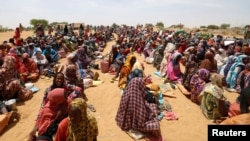The U.N. refugee agency, UNHCR, warned Wednesday that the humanitarian emergency in Sudan triggered by two rival generals battling for control of the country has created a protection crisis both inside Sudan and in neighboring countries of asylum that risks destabilizing the region the longer the conflict goes on.
“I think anywhere in the world where you have a conflict that drags on, and there is the potential for Sudan to drag on, it will become another of one of my long list of protracted problems that I have in my part of the world,” said Ayman Gharaibeh, UNHCR regional bureau director for the Middle East and North Africa.
“Start from Yemen and into Libya, all of them. So, quite clearly, even if you have the most hospitable nation, even if it is fully funded, there comes a limit where the public. even if it is supported, they will reach a point of fatigue,” he said. “I hope it does not come to that.”
More than 5.4 million people in Sudan have become uprooted from their homes since clashes between the Sudanese Armed Forces and the paramilitary Rapid Support Forces erupted in mid-April, making this the fastest displacement crisis in the world.
The UNHCR says the dangers encountered by people fleeing violence also have made Sudan one of the largest protection crises facing the agency today.
“We are close to 1.1 million women, children, as well as older persons who have crossed the borders, often under very difficult circumstances,” said Mamadou Dian Balde, UNHCR regional refugee coordinator for the Sudan situation.
During a recent visit to Sudan, he said he witnessed the desperation, distress and dangers experienced by vulnerable, unprotected people as they were leaving for South Sudan.
“I have seen and I have witnessed the level of human rights violations that have happened in Sudan. So that what we hear from people who have crossed the borders is really heartbreaking,” Balde said.
“And that is the protection crisis that we are faced with, and it has been ongoing for the past six months,” he added.
His colleague Abdouraouf Gnon Konde, UNHCR regional bureau director for West and Central Africa, agreed that the implications of the Sudan crisis on neighboring countries was severe, especially on Chad and the Central African Republic.
“Both nations are grappling with the impacts of refugees fleeing the conflict in Sudan, bringing with them stories of despair, loss, and unfortunately continued vulnerability,” said Konde.
He noted that Chad had become the epicenter of the Sudanese crisis with 420,000 new arrivals in the past six months, a number that was likely to reach 600,000 by the end of the year.
“This is a protection crisis. Of the many horror stories I heard, the scale of gender-based violence is particularly chilling, including sexual assault, rape, forced prostitution,” said Konde.
Before this crisis arose, Konde noted that Chad already was hosting 450,000 refugees from Sudan and other countries. “Today, one in 17 is a refugee in the country,” and we do not have the resources to support them.
While protection is of primordial concern, Balde said millions of refugees and internally displaced people also are threatened by their inability to receive lifesaving humanitarian assistance.
Balde said only 29% of the $1 billion aid agencies needed to combat the humanitarian emergency triggered by the conflict has been received.
He warned of serious repercussions for the millions of vulnerable people unable to fend for themselves If the international community does not close this funding shortfall.
“It is people who no longer can eat. People who no longer are able to have access to their basic rights. But it is also negative coping mechanisms,” Balde said. “It is about child labor. It is about risk of prostitution. It is taking communities and putting them in the hands of smugglers and traffickers.”
Balde said the UNHCR projects the number of Sudanese refugees is likely to reach 1.8 million by the end of the year.
He warned, “The longer the crisis drags on, the greater the risk that the conflict will spill over into other countries and destabilize the region.”




